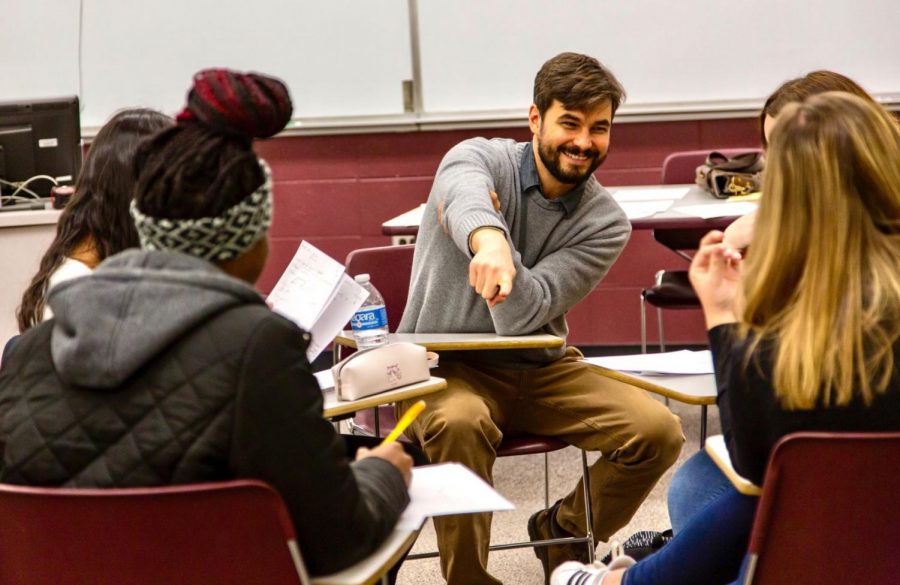Math 110 section adopts new structure
Math professor Lance Vobornik discusses a worksheet with his students during class Nov. 6. The Math 110 section Vobornik teaches uses an inquiry-based learning model.
November 17, 2019
DeKALB — Fourteen students sat together quietly in small groups as Math 110 began early one Wednesday morning.
Math professor Lance Vobornik started class by asking if students had questions about material that was recently covered. Later, he tasked students with solving a worksheet of problems together.
Vobornik’s section of Math 110 is a pilot co-remediation course that is teaching students through inquiry-based learning.
First-year mechanical engineering major Joey Arcangeletti said he and his classmates have to work for the answers. Struggling through problems promotes long-term learning versus short-term memorization, he said.
In a corequisite course, students who are required to take remedial courses are still enrolled in a college-level course, Omar Ghrayeb, vice provost for undergraduate studies, said.
At the same time, students have the support of a student instructor. Students are also required to complete their homework at a computer lab located in Graham Hall.
Ghrayeb said this method could expedite the process of students taking their required college-level math courses, which could save students one year of taking remedial courses.
As class continued, Vobornik wrote two problems on a white board and instructed students to solve them. Vobornik and the student instructor, or SI, walked around the classroom to assist students as they work.
First-year management major Vilaya Sirivong said Vobornik and the student instructor are helpful, and the students are productive while in class.
“It wasn’t boring at all,” Sirivong said.
This semester, the department of mathematical sciences, with support from the provost, piloted the Math 110 co-remediation course.
Twenty students required to take remedial courses were immediately placed in the pilot Math 110 corequisite course.
Students are placed in a math course corresponding with the score they receive on the math placement exam.
Students are required to take a math placement exam if they need to enroll in an entry-level mathematics course as part of their major, according to the NIU Testing Services website.
If a student receives a math placement level below a “C”, remedial courses are required before being placed in a college-level math course, according to the NIU mathematics placement exam score interpretation document.
Sirivong said part of what makes this class different is its structure.
Students are placed into groups that rotate their members every three weeks, Sirivong said. She said it’s beneficial to have small groups because she and her classmates aren’t strangers.
Vobornik’s class could impact the structure of future courses at NIU as the provost funded $16,000 for course development and for instructor training, Ghrayeb said. Course development began last spring. Vobornik attended conferences to learn about inquiry-based learning.
“If we think about teaching on a spectrum between all discovery and all telling, we are trying to get as close to all discovery as possible,” Vobornik said. “The point is not to stand there and lecture at [students], but to have them engage deeply with the mathematics and therefore learn it at a deeper level.”
Vobornik, said inquiry-based learning and co-remediation are more engaging than lectures.
“I don’t think students get a lot of value out of that anymore,” Vobornik said. “When you walk around campus and you see lectures — I mean how many students are on their phones in the back and not listening? Is that really effective instruction?”
Students provide feedback about the pilot course through focus groups and writing assignments.
“So far, the feedback has been positive,” Ghrayeb said.
Sirivong said Math 110 is her favorite class.
Ghrayeb said the number of students passing the course will be monitored as well as their progress in subsequent math courses.
“The bottom line is, we don’t want to set our students up for failure, we want them to be successful,” Ghrayeb said. “We want to make sure that they have the skills to be successful in the [college-level] courses.”







